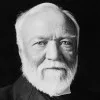Are there no ideals more stirring than those of martial glory? Is this generation conscious of calls to the service of native land in ways no more worthy than the way of taking a musket and killing somebody? You ask, in the language of Prof. James, for a moral equivalent for war. A patriot needs only look about to find numberless causes that ought to warm the blood and stir the imagination. The dispelling of ignorance and the fostering of education, the investigation of disease and the searching out of remedies that will vanquish the giant ills that decimate the race, the inculcation of good feeling in the industrial world, the cause of the aged, the cause of the men and women who had so little chance — tell me, has war anything that beckons as these things beckon with alluring and compelling power? Whoso wants to share the heroism of battle let him join the fight against ignorance and disease — and the mad idea that war is necessary.
Andrew Carnegie (1835-1919) American industrialist and philanthropist
“A Plea for Peace,” New York Times (7 Apr 1907)
(Source)
Quotations by:
Carnegie, Andrew
Yet the day is not far distant when the man who dies leaving behind him millions of available wealth, which was his to administer during his life, will pass away “unwept, unhonoured and unsung,” no matter to what uses he leaves the dross which he cannot take with him. The man who dies thus rich dies disgraced.
Andrew Carnegie (1835-1919) American industrialist and philanthropist
“The Gospel of Wealth,” Part 1, North American Review (1889-06)
(Source)
Collected in The Gospel of Wealth and Other Timely Essays (1900).
You cannot push anyone up the ladder unless he is willing to climb.
Andrew Carnegie (1835-1919) American industrialist and philanthropist
(Attributed)
Most common form of an adage Carnegie frequently used regarding charity. Variants:
- "It is of no use to boost a man up a ladder unless he is willing to climb himself." -- In Cyrus Holdridge, "A Millionaire and His Hobby," Our Day (Jan 1900).
- "You cannot push anyone up a ladder unless he is willing to climb a little himself." -- Elbert Hubbard, Little Journeys to the Homes of Great Business Men, Vol. 25 (1909).
Whatever agencies for good may rise or fall in the future, it seems certain that the Free Library is destined to stand and become a never-ceasing foundation of good to all the inhabitants.
A man’s first duty is to make a competence and be independent. But his whole duty does not end there. It his his duty to do something for his needy neighbors who are less favored than himself. It is his duty to contribute to the general good of the community in which he lives. He has been protected by its laws. Because he has been protected in his various enterprises he has been able to make money sufficient for his needs and those of his family. All beyond this belongs in justice to the protecting power that has fostered him and enabled him to win pecuniary success. To try and make the world in some way better than you have found is to have a noble motive in life.


